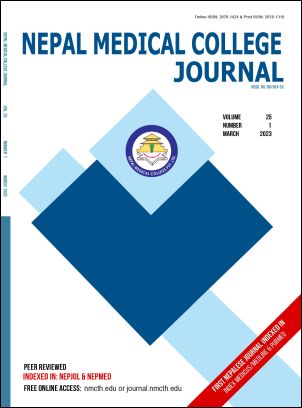A study of prophylactic low dose ketamine and granisetron for prevention of shivering during spinal anesthesia
DOI:
https://doi.org/10.3126/nmcj.v25i1.53384Keywords:
Shivering, Ketamine, Granisetron, Spinal anesthesiaAbstract
Spinal anesthesia significantly results in shivering and hypothermia as unwanted effect. Shivering increases oxygen consumption which may be deleterious in patients who have low cardiac and pulmonary reserve. We conducted this study to evaluate the efficacy of Ketamine and Granisetron for prevention of shivering under spinal anesthesia. In this randomized prospective study, 90 Patients aged 18-60 years of ASA physical status I & II undergoing various surgical procedures were included and allocated alternately to one of the 3 groups; Normal saline (Group P), Ketamine 0.25mg/kg (Group K) and Granisetron 40μg/kg (Group G). Incidence of shivering, effect on haemodynamics, nausea, vomiting, and sedation were recorded. The patients were comparable in terms of demographic variables, baseline temperature, and median level of sensory blockade. Shivering was present in 10 (33%), 3 (10%), 1 (3%) respectively in Group P, G, K. In Group P, 8 (26%) patients experienced shivering at Grade 3 and this was significantly higher than Groups G and K (P = 0.0003). None of the patients were sedated in Group G and P. The sedation was seen in 8 cases (26%) in Ketamine group, most of them were sedated to grade 2 and only 3 were of grade 3 (P<0.05). No hallucination was seen in any of the patients. Low dose ketamine and Granisetron are effective for prevention of shivering in comparison to placebo during spinal anesthesia and ketamine is more effective than granisetron.
Downloads
Downloads
Published
How to Cite
Issue
Section
License
Copyright (c) 2023 Nepal Medical College Journal

This work is licensed under a Creative Commons Attribution 4.0 International License.
This license enables reusers to distribute, remix, adapt, and build upon the material in any medium or format, so long as attribution is given to the creator. The license allows for commercial use.




